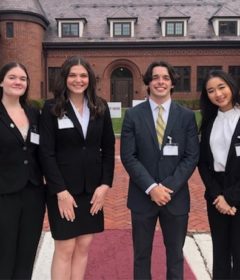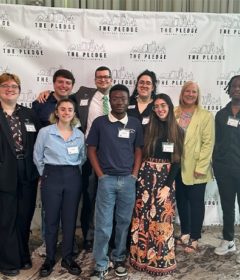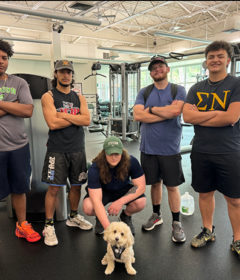Forum Raises Multiple Issues Around Immigration
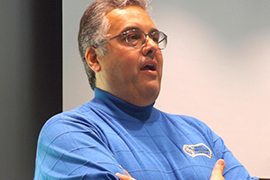
Sanctuary status was just one of the issues that emerged during an immigration forum held Saturday, April 1, and led by attorney, Stetson Law alumnus and adjunct professor Arturo R. Rios.
“It was an engrossing and non-partisan forum on the history of immigration law,” said Rosalie Richards, Ph.D., Associate Provost for Faculty Development. “(Rios talked about) the positive politics of DACA; how individuals with DACA status should plan; and much more.”
The forum was held in response to recent, stricter changes in immigration policy and increases in enforcement by President Trump and his administration. The event at the Marshall & Vera Lea Rinker Welcome Center was attended by some two dozen students, university administrators and staff, and members of the public.

Trump’s bans on travel from certain Muslim-majority countries “got all the attention,” said Rios, whose private practice is the Rios Immigration Law Firm in St. Petersburg. But more significant, Rios added, was Trump’s revocation of Obama administration policies that had made some immigration issues less of a priority than others.
According to Rios, Trump’s immigration policy is “anybody in the U.S., if they are undocumented, would be subjected to removal proceedings. If you’re here illegally, even if you don’t have a single incidence of throwing a piece of paper on the floor, you’re going to be put in removal proceedings.”
During Trump’s campaign, he pledged to end Obama’s Deferred Action for Childhood Arrivals program, or DACA. That program allows some undocumented immigrants who entered the country before they turned 16 to remain in the United States to work or study for renewable two-year periods. Although Trump has backed down on whether he will end DACA, that threat has spurred universities around the country to declare themselves “sanctuary campuses,” akin to the concept of sanctuary cities. According to an article in the journal of the American Bar Association, sanctuary campuses would “limit their cooperation with federal immigration enforcement authorities.”
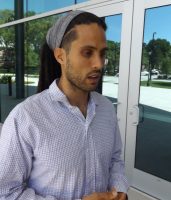
Stetson student Enric Cordoba, a senior from Spain who is pursuing a self-defined major combining political science, philosophy and economics, attended the forum and said he is working on a campaign for Stetson to become a sanctuary campus.
Said Rios, “Educational law and policy are beyond my expertise, but I don’t think an educational institution would have any legal responsibility to a student who is in DACA and then suddenly is out of DACA. Now morally, should institutions be doing something? Absolutely. What steps should be taken by institutions in that regard? First of all, identify students under DACA and let them know: Have you thought about a plan B. I’m of the philosophy that it’s also the students’ responsibility to talk to a lawyer and see what’s going on.”
Concerning sanctuary campuses, “I think it’s a wonderful idea,” said Rios, who is a member of the Stetson University College of Law Board of Overseers. However, Rios added: “But I’m not well-versed enough to know what the repercussions for the institution are going to be. What’s that line from ‘Star Trek’ when Spock was dying? The needs of the many outweigh the needs of the few. If there are financial repercussions as far as grants or other issues, then the boards of those institutions and their administrations have to look at how much they are sacrificing. It’s laudable that an institution would stand up, but they have to think of the whole body.”
In an interview after the forum, Cordoba said he had presented a sanctuary campus proposal to an SGA senate committee. That led to a poll asking students whether Stetson should become a sanctuary campus.
“It’s not like if 70 percent of the student body vote yes then we’re going to become one,” said Cordoba, who is attending Stetson under an F1 visa (one that is for nonimmigrants). “But it’s going to be a tool for me to keep moving.”
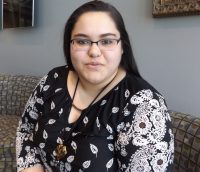
Maria Rodriguez, a senior majoring in international business who was born in Miami to Cuban-born parents, said the Trump administration’s immigration policies will “not directly affect” her or her family, “not in the sense that if this occurs, am I at risk of being deported? I am not.”
But she added, “I have a friend who I had no idea was a DACA student and came out and was extremely worried. She’s very active on campus and in a sorority. It showed really quickly I have no idea how many at-risk friends I have.”
“I’m an eternal optimist,” said Rios, who noted he is from Puerto Rico. “I think this is the greatest country in the world. My whole belief system would collapse if I were to think your everyday American like me would want people to get deported and have families split apart. If people do hold those ideas, I think it’s because of misinformation.
“In this country we’ve always had a bogeyman. It was the communists or whatever. And now the bogeymen are the illegals. … I think immigration is the civil rights issue of the 21st century.
“We’re the country of hope. We’re the country of immigrants. Ask the Native Americans how happy they are about all this. We started this whole thing, and now we have to live up to it and live up to it with honor. I think we will, I really do. The problem is it’s hard and the laws are complicated.”
— Rick de Yampert

